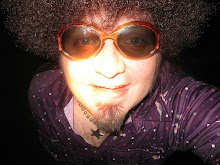While there, I managed to see a few of the latest "Bollywood blockbusters" of the time - two of them at the stunning Raj Mandir Cinema in Jaipur, Rajasthan. Since there were no subtitles, I really didn't understand much (although Indian movie scripts often have this weird tendency to switch randomly from Hindi to English every so often), but it's always a good time, and I've always liked Indian music. So, to mark this anniversary, I offer a few of the Bollywood movie soundtracks I have collected on vinyl - in all cases, I wasn't really searching for these albums, they just turned up in record shops, often in the "world music" section.
_______________________________________________
 Hariyali Aur Rasta ("The Greenery and the Road") is a black-and-white oldie from 1962, so the music is definitely not like anything you'd hear these days. It's a romantic flick, so most of the songs are melodious love songs backed up by string orchestra, which has always been popular in Bollywood music, particularly back in the "old days".
Hariyali Aur Rasta ("The Greenery and the Road") is a black-and-white oldie from 1962, so the music is definitely not like anything you'd hear these days. It's a romantic flick, so most of the songs are melodious love songs backed up by string orchestra, which has always been popular in Bollywood music, particularly back in the "old days".Most songs are sung by hugely popular Lata Mangeshkar, whose music was featured in a previous post on this blog, in some cases doing a duet with the equally famed male singer Mukesh.
_______________________________________________ Nikaah (an Arabic word roughly translated as "marriage contract"), released in 1982, was a film that dealt with the relatively touchy subject (for the time) of divorce within the Indian Muslim community.
Nikaah (an Arabic word roughly translated as "marriage contract"), released in 1982, was a film that dealt with the relatively touchy subject (for the time) of divorce within the Indian Muslim community.
It was directed by B.R. Chopra who was well-known for directing these types of "social commentary" films. As is often the case with people in the Hindi film industry, Chopra is from a "film family"; his brother Yash Chopra (see next entry) and nephew Aditya Chopra are also popular film directors.
_______________________________________________ Directed by Yash Chopra, Chandni ("Moonlight"), released in 1989, became a huge box-office hit. It's basically the same love-triangle story that has been explored in countless other Hindi movies, but for some reason it struck a chord and eventually had a major influence on the industry. Its massive success, along with other films of the day, helped bring about a shift away from the violent action movies popular in the late 1980s, towards films with more romantic and family-based themes.
Directed by Yash Chopra, Chandni ("Moonlight"), released in 1989, became a huge box-office hit. It's basically the same love-triangle story that has been explored in countless other Hindi movies, but for some reason it struck a chord and eventually had a major influence on the industry. Its massive success, along with other films of the day, helped bring about a shift away from the violent action movies popular in the late 1980s, towards films with more romantic and family-based themes.
_______________________________________________ Contrary to what I just said about the shift to fewer violent action films in the late 80s, Tujhe Nahin Chhodunga, also released in 1989, is clearly a bloody shoot-'em-up affair. Based on the cover, everybody has a gun, or possibly a grenade, and is about to kill or get killed (or, in the case of the young lady, perhaps have bad things happen to them after their judgment is impaired by drinking two glasses of wine at a time).
Contrary to what I just said about the shift to fewer violent action films in the late 80s, Tujhe Nahin Chhodunga, also released in 1989, is clearly a bloody shoot-'em-up affair. Based on the cover, everybody has a gun, or possibly a grenade, and is about to kill or get killed (or, in the case of the young lady, perhaps have bad things happen to them after their judgment is impaired by drinking two glasses of wine at a time).
While most of the of music on the other albums featured here is carefully crafted, this is more of the hastily-thrown-together "potboiler" stuff, often featuring synths and disco beats. The track "Bum Chic Bum" is particularly notable for this.

